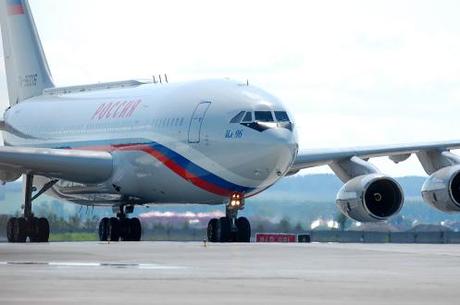Writing letters to the citizens of another country seems to be something President Putin finds as productive. As his staff prepares his Ilyushin Il-96 airplane for the Tuesday trip to Hanoi, the Vietnamese people are opening their newspapers to a letter from Russian President Putin.

(фото: Алексей Вахрушев)
In the letter Mr. Putin spoke of the history between the two nations and the opportunity to broaden ties even further with the Vietnamese people:
Ahead of my third visit to the Socialist Republic of Vietnam, I would like to take this opportunity to directly address Vietnamese public and share some thoughts on the future of our bilateral relations.
Russian-Vietnamese friendship has stood the test of time, having lived through the numerous tragic events of the 20th century, drastic changes in the world as well as in our countries. The main thing has always remained the same, however – respect towards each other, traditions of confidence and mutual assistance, ability to appreciate selfless support of the partners that will never betray.
In this context, let me quote famous words of President Ho Chi Minh: “When you drink water, think of its source.” I consider that phrase to be a spiritual instruction to the present and future generations of citizens of our countries. One should always remember our common history and everything that unites us. This guarantees continuity and stability of future-oriented relations.
We are happy with major achievements reached by Vietnam on its path towards important economic and social reforms. Russia addresses complex national issues as well. We believe that active involvement in the integration processes, both at global and regional levels, is a powerful resource for development. We attach particular importance to cooperation with the Asia Pacific States among which Vietnam is one of the leading centers of growth.
The positions of our countries on issues relating to the global agenda are similar in many aspects. Together we seek answers to new challenges and threats. We uphold the rule of law in international relations and advocate that no alternative political or diplomatic tools should be used for resolving disputes and that every state has a right to choose it own path of development.
All these factors determine the intensity of Russian-Vietnamese strategic partnership which we can rightly call comprehensive. Last year, bilateral trade increased by 20 percent and amounted to $3.66 billion. We expect that it will reach $7 billion as early as 2015 and increase up to $10 billion in 2020.
The signing of a free trade area agreement (FTA) between the member states of the Customs Unions and Vietnam would contribute to achieving these objectives, which corresponds to the logic of political and economic integration in Eurasia and the Asia-Pacific region. The negotiations on a FTA are under way, and we hope to successfully complete them.
Energy, oil and gas sectors have traditionally played a key role in the development of Russian-Vietnamese industrial and investment cooperation. For instance, our leading joint venture Vietsovpetro has accumulated a unique technological expertise of working on the continental shelf. Over the years, the company has produced 206 million tons of oil and its total profits account for tens of billions of dollars.
The companies Rosneft and Gazprom increase their presence in Vietnam. Their projects relate to the production of hydrocarbons, modernization of refining capacities and supply to Vietnam of the liquefied natural gas from the Russian Far East.
Let me emphasize that our oil and gas cooperation is two-way and reciprocal. Rusvietpetro is an example of a successful joint venture in the Yamalo-Nenets autonomous district. We also expect a lot of another joint company Gazpromviet which has started the development of oil and gas fields in the Orenburg region and other Russian territories.
Our cooperation in energy goes far beyond hydrocarbon production. Russia helps Vietnam to develop a nuclear industry which is a totally new sector for the country. Rosatom will be responsible for the construction of the first Vietnamese nuclear power plant in the province of Ninh Thuan. The first and second nuclear units are scheduled to be launched in 2023 and 2024, respectively. Plans are being discussed to jointly construct a Nuclear Science & Technology Center.
Peaceful use of outer space and Russia’s GLONASS satellite navigation system, air and rail transportation development, engineering, mining, banking and public health seem to be very promising areas of cooperation. The goal of the above projects and initiatives is to improve our investment, technology and industrial collaboration.
Our military and technical cooperation has taken a totally new dimension. It is no longer limited to export supplies, steps are being taken to launch in Vietnam licensed production of advanced military equipment with the assistance of Russian companies.
We have always been proud of the traditions of humanitarian cooperation in the field of education, science and culture. It is meaningful that this year Vietnam has been allocated the highest quota (except for the CIS countries) for training specialists in Russian educational institutions. Today about 5,000 citizens of Vietnam receive education in Russia, about 2000 of them study under interstate agreements.
I should underline the joint activities of our scientists, including many years of work of the Russian-Vietnamese Tropical research and technological center. Specialists all over the world highly appreciate the results of its applied and fundamental research.
My visit takes place during the Days of Russian culture in Vietnam. We are pleased to see that our Vietnamese friends are truly interested in our art. On their turn Russian citizens are waiting for the Vietnamese cultural workers to come to visit Russia. I am sure that the Days of Hanoi in Moscow in late November this year will have great success. Such exchanges have already proved their importance. We intend to continue this practice.
The number of Russians visiting Vietnam shows the willingness to learn better rich history and culture of the Vietnamese people. Last year this number doubled and for nine months of this year it has grown up by 66 per cent having risen beyond 200,000 people. I think that this tendency will continue taking into account the successful development of tourist infrastructure in Vietnam.
It is difficult to enumerate the areas in which Russia and Vietnam do not develop fruitful cooperation. I expect that the future high-level negotiations in Hanoi will be constructive as usual and will give new momentum to the strategic partnership between our states and peoples.
Editors note: Mr. Putin will be in Hanoi tomorrow and then travels to the Republic of Korea (South) for a state visit Wednesday before returning to Moscow to prepare for next week’s arrival of Israeli Prime Minister Benjamin Netanyahu on 20 November.


